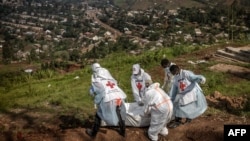On Feb. 20, the U.S. Treasury Department sanctioned a minister in the Rwandan Ministry of Foreign Affairs for acting as Rwanda’s government “liaison to M23 and orchestrating RDF support for the armed group.”
James Kabarebe was sanctioned for “being responsible for or complicit in, or to have engaged in, directly or indirectly, actions or policies that threaten the peace, security, or stability of the DRC, in or in relation to the DRC,” the Treasury Department said.
The statement was one of many in recent weeks coming from the United States, United Nations, the DRC and Human Rights Watch, among others, to accuse Rwanda of supporting Congo’s M23 rebels.
The accusations have grown in frequency and intensity this year as M23 seized territory in the eastern Democratic Republic of Congo, taking the city of Bukavu on Feb. 16, about three weeks after seizing Goma, where more than 3,000 people were killed in the fighting and 2,000 others injured.
Rwanda has repeatedly denied supporting M23. In mid-February, as world leaders gathered in Munich to discuss security issues around the world, Rwandan Defense Minister Juvenal Marizamunda forced his way onto a panel that was hosting a live press conference with the presidents of DRC and Ghana.
“Rwanda has never attacked Congo and will never do so. What we have done is to ensure that nothing can cross from Congo and jeopardize our security,” Marizamunda declared.
That is false.
The U.N., the U.S., human rights groups and news organizations have compiled ample evidence that Rwanda is backing M23 rebels — and that Rwandan soldiers are fighting alongside them inside the territory of the DRC.
Recent reports have revealed the continued presence of the Rwanda Defense Forces, or RDF, on the ground in eastern DRC throughout the conflict.
On Feb. 7, British newspaper The Guardian reported in an exclusive story that “multiple intelligence, military and diplomatic sources say that ‘very significant’ numbers of soldiers from the Rwanda Defense Force, or RDF, have died supporting an offensive by M23 rebels in DRC.”
The story cited two high-ranking intelligence officials with knowledge of the RDF as saying losses sustained by Rwanda probably run into the “thousands,” although pinning down a definitive figure is challenging.
On Feb. 11, Global Conflict Tracker, a project for the Center for Preventative Action, or CPA, that aims to help policymakers strategize to prevent and mitigate armed conflict, said, “Rwanda, the primary backer of the M23 armed group, supported its offensive in eastern DRC with three to four thousand ground troops.”
In December 2023, a U.N. group of experts on Rwanda said it had obtained aerial footage and photographic evidence of the RDF's direct interventions and troop reinforcements inside the DRC territory.
According to the U.N., “in a video shot on November 15, 2022, at least 25 combatants, members of RDF, were shown marching in columns in Kiwanja in Rutshuru territory (eastern DRC), which had been under M23 control since October 29, 2022.”
Also, on Feb. 7, during the 37th special session of the U.N. Human Rights Council, the council said it has evidence of Rwanda's military support for M23 rebels.
The U.N. rights council said Rwanda must “respect the sovereignty and territorial integrity of the Democratic Republic of Congo” and “remove its troops” from the DRC territory.
U.N. experts have long accused the Rwandan armed forces of “de facto control” over the M23 operations, including training the rebels and providing the group with weapons.
On Jan. 27, when the M23 rebels advanced to Goma city, the U.N. peacekeeping chief Jean-Pierre Lacroix said, “There was no question that there are Rwandan troops in Goma supporting the M23.” He noted that “it was difficult to tell the exact numbers” of Rwandan troops “on the ground in Goma.”
On Jan. 28, acting U.S. Ambassador to the U.N. Dorothy Shea said, “Rwanda must withdraw troops from the DRC,” accusing the nation’s government of endangering the U.N. and humanitarian personnel, as well as civilians, by its “ongoing use of GPS interference and deployment of advanced weapons and systems.”
“We are similarly concerned that M23’s and Rwanda’s ongoing advances are opening up a bloody new front to this conflict in South Kivu,” Shea said, adding, “Rwanda’s support to M23 remains wholly at odds with its robust support to U.N. peacekeeping.”
On Aug. 24, 2023, the U.S. sanctioned the head of operations for the Rwandan armed forces 3rd Division, Brigadier General Andrew Nyamvumba, after the division “entered DRC territory in 2022, and in conjunction with M23 combatants, attacked FARDC positions and camps, resulting in FARDC casualties.”
FARDC is an abbreviation for the DRC armed forces.
In September 2024, New York-based Human Rights Watch reported that the Rwandan army and the M23 armed group have “indiscriminately shelled displacement camps and other densely populated areas near Goma in eastern Democratic Republic of Congo.”
In January of last year, Human Rights Watch documented five “unlawful attacks by Rwandan forces and the M23 in which artillery or rocket fire struck displacement camps or populated areas near Goma ... killing at least 17 civilians, including 15 children.”
The rights group also accused the Congolese army and allied Wazalendo militias of “opening fire inside displacement camps, killing and wounding civilians, and raping women in the camps.”





